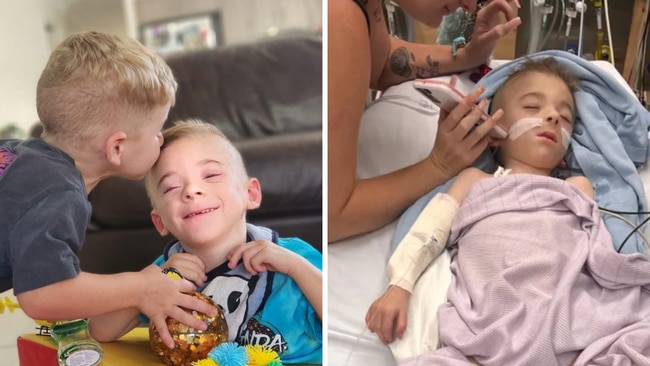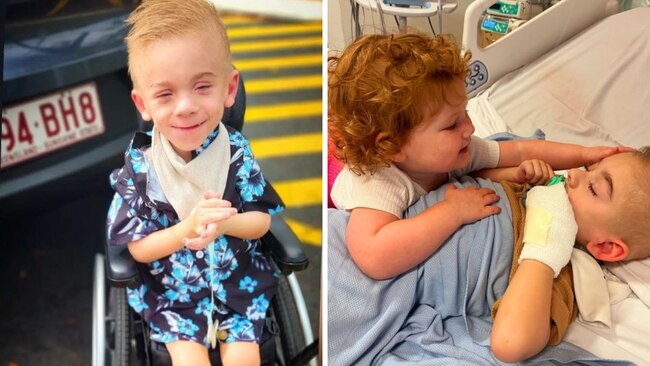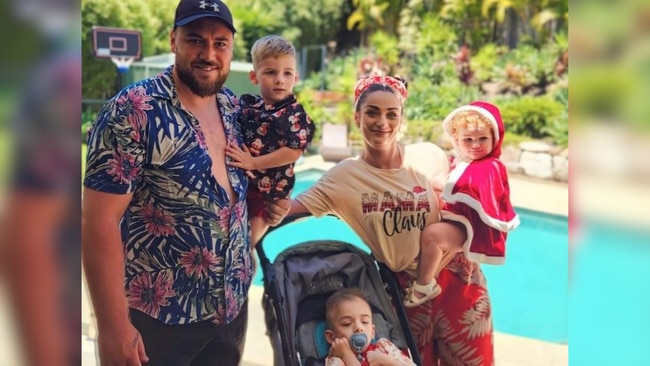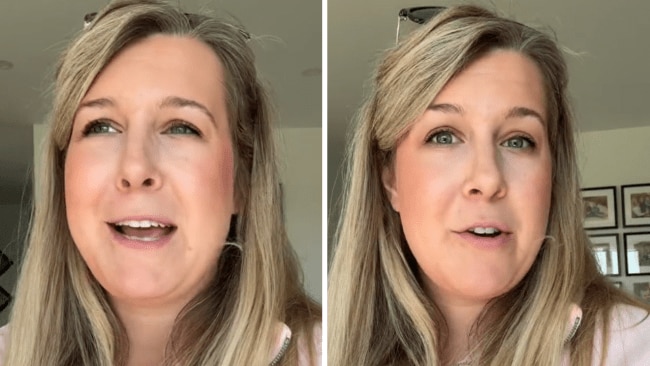Drs said I was an erratic mum, then they diagnosed my son with a rare condition
“You hear about these stories, but you never think it’s going to be you,” mum Maria tells Kidspot.

Family Life
Don't miss out on the headlines from Family Life. Followed categories will be added to My News.
Doctors knew something was different about Oskar the moment he was born.
It was 2018 when Maria went into labour. She was at home with her husband, Doug, but her child was ready to arrive.
Rushing to the hospital, the Queensland woman gave birth to Oskar in less than two hours, forcing herself to wait until she made it to the hospital entrance before welcoming him to the world.
Want to join the family? Sign up to our Kidspot newsletter for more stories like this.
RELATED: Parents stunned after baby girl born with no eyes

Queensland boy third in Australia to receive rare diagnosis
The baby was moved to the special care nursery for 10 days, where medical staff told Maria and Doug their son “had microcephaly, a large anterior fontanelle, facial dysmorphia … just a large number of issues that they wanted to look at.”
They informed the new parents that he would require intensive therapy at three months old, but they would “see how he goes.”
At eight weeks old, Maria knew there was more to the story, so she spoke to the medical team - and got shut down.
“I was told I was an erratic mother and there was nothing wrong with him,” she told Kidspot.
But Maria was on the money; when Oskar was six months old, he hadn’t grown bigger than a newborn.
“He was this tiny, little human,” she said. “He looked like a pixie, we’ve always called him a pixie.”
She began an intensive round of research, learning about “pretty much every syndrome known to man.”
Still left without any answers about her son, Maria found out she was pregnant with her second child, Tommy. “We were really worried Tommy was also going to have the syndrome,” Maria said.
Then, in January 2020, when Maria was 14 weeks pregnant and Oskar was 14 months old, doctors put him through genetic panelling, finally receiving a formal diagnosis.
Oskar had nicolaides baraitser syndrome, an extremely rare condition that affects the organs and facial appearance, and results in a mild to severe intellectual disability.
The condition is so rare that only three people in Australia have received the official diagnosis, and at the time, he was one of only 100 people to have the condition.
“That was one of those moments was like, ‘Yeah, it’s really happening to us,’” Maria told Kidspot. “You hear about these stories, but you never think it’s going to be you, I guess.”
Thankfully, doctors told Maria her son’s life expectancy was “pretty good” and would “most likely make it to adulthood.” However, medical complications were likely to cause ongoing health problems.
He was later diagnosed with cerebral dysfunction, microcephaly, hypertonia, hypotonia, dystonia and failure to thrive.
RELATED: ‘My 16-year-old daughter is allergic to the sun, the cold and thunderstorms’

“Is he gonna die?”
Oskar has undergone strenuous therapy for his condition, but there are still constant challenges along the way.
A major element of Oskar’s health was still puzzling Maria and the medical team - he was having frequent seizures, which doctors were “really struggling” to manage and control.
He was soon diagnosed with complex epilepsy and given medication to help relieve him from the ongoing seizures. But the medication doesn’t always work, Maria told Kidspot.
“This means he has to go into the resus bay at the hospital, and they give him medication that will lower his heart rate and respiratory rate; they have to intubate him at any time to take over his breathing,” she said.
There are five medications on his list, and so far has only had to reach level three before coming back to the baseline.
“He’s been in resus three times now,” she said. “We’re just struggling to get on top of these seizures.”
“The more you give these medications, the less likely they are going to work next time.”
With the medication only working occasionally, the family has started looking into natural alternatives to manage his convulsions and help ease his pain.
Since June 2023, Oskar has been admitted to hospital 10 times.
Then, in November, things became incredibly terrifying - Oskar was suffering from sepsis, and things were looking bleak.
“We really thought we were going to lose him,” said Maria. When they arrived at the hospital, medical staff told the family to “abandon the car at the front of the hospital”, and security would be able to move it.
They had to get Oskar inside.
“She asked me if I had any questions, and I was like, ‘Is he gonna die?’” Maria recalled. “Like, are we talking about him dying?”
The nurse informed Maria and Doug she couldn’t be sure, but the chances weren’t good.
“If he was to get sepsis, the chance of his little body being able to recover would be really low,” she said.
But Oskar wasn’t ready to go anywhere just yet; within 24 hours, he made a miraculous recovery. “He woke up clapping and laughing,” Maria told Kidspot.
RELATED: A lady at the supermarket said: ‘He can’t see with those stupid glasses on'

“He’s definitely a fighter, you know, because he wants to be with us”
Despite his ongoing medical complications, Oskar is a bright and bubbly boy who finds the best parts of life and lives to the fullest.
“He’s just a superstar,” Maria told Kidspot. “You’d be amazed at how he’s doing it. He’s definitely a fighter, you know, because he wants to be with us.”
Heartbreakingly, they know that Oskar may not be around forever, so they want to give him the best life they possibly can while he’s here.
“No parent wants to talk about [the passing of a child], but my husband and I think, ‘What do we want for him?’” she said.
“We’ve always lived by the motto of quality over quantity. If we get 10 good years, where he’s happy and loving life, that’s better than 30 years with him where he’s miserable and suffering.”
While Oskar recovers in hospital, Maria and Doug have spent weeks away from their family, including their two younger children.
With ongoing medical complications and research into natural therapy, the family are struggling to keep up with their everyday lives.
Naturally, Oskar is their main priority, leaving them unable to work and fronting unexpected costs that come with endless hospital stays.
In an effort to keep their lives as regular as possible, Maria’s sister Nicole set up a GoFundMe campaign to assist with medical costs and help their boy live his life to the fullest.
“It's definitely hard,” Maria said. “It's not an easy road, but he's worth it.”
You can find the fundraiser here.
More Coverage
Originally published as Drs said I was an erratic mum, then they diagnosed my son with a rare condition





